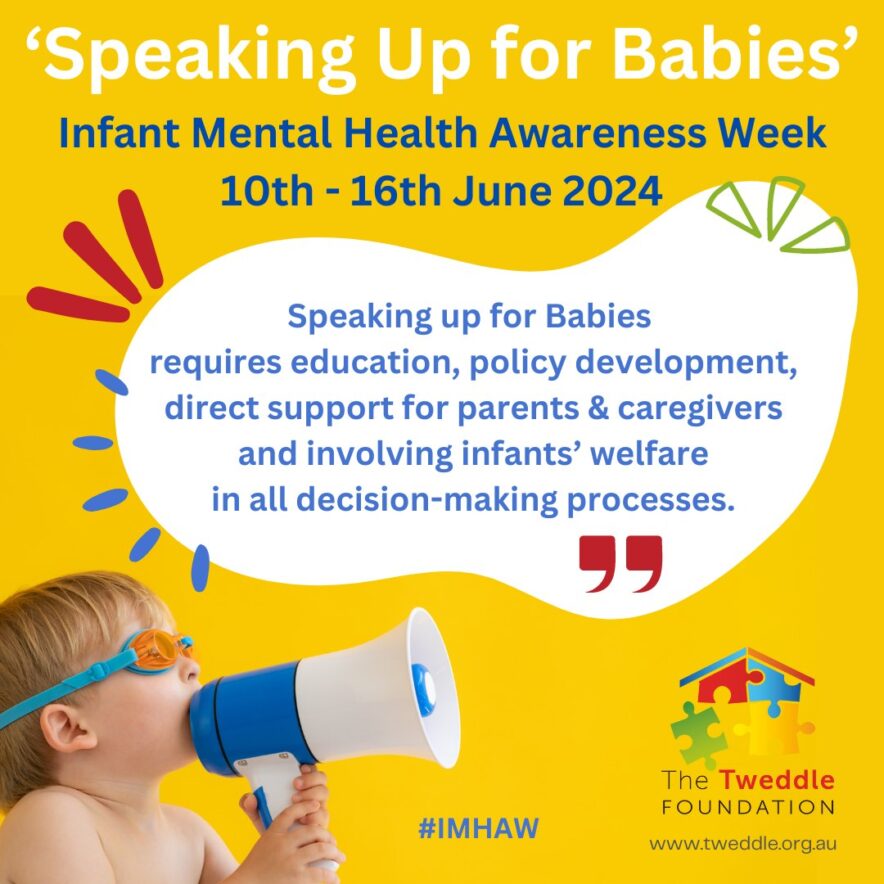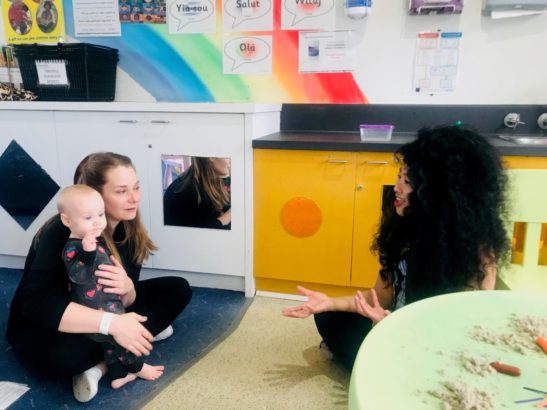Tweddle advocates for baby and toddler voices to Speak as Loud as Actions

Victorian Early Parenting Centre Tweddle has produced a comprehensive position paper on the importance of the voices of babies and toddlers being represented in the state’s Child Safe Standards.
Speaking as Loud as Actions – A Child Safe Standards Tweddle Position Paper has been collaboratively developed by Tweddle’s team of expert clinicians, drawing on their extensive experience and research to provide insights, strategies, and best practices for effectively listening to and interpreting the needs and desires of this vulnerable demographic.
Victoria’s Commission for Children and Young People mandated the Child Safe Standards in Victoria in 2016, with new, stronger standards coming into effect from 1st July 2022.
‘Speaking as Loud as Actions’ delves into a specific often overlooked aspect of child protection: the voice of babies and toddlers who do not possess a physical voice in the traditional sense but communicate through nuanced cues and actions.
“Babies and toddlers’ repertoire of communication can tell us everything we need to know about their family relationships and environmental experiences, including their participation in family services. Understanding and appropriately responding to these forms of communication are paramount to ensuring their safety, well-being, and inclusion in decision-making processes,” authors note.
By shedding light on this often-neglected aspect of child advocacy, Tweddle aims to empower service providers to create environments that truly prioritise the voices of all children, regardless of their age or ability to verbally express themselves.
Starting in house
Tweddle is a specialist Victorian public hospital which operates as an early parenting centre, and as such it is one of the many organisations required to comply and provide evidence of meeting all requirements against the present 11 Child Safe Standards.
In considering how to plan and progress compliance strategies, Tweddle’s admission data was explored. What it described was that the majority of babies and/or toddlers attending its programs were aged between 6-18 months.
“In this developmental phase it is not an expectation that these clients can fully express and verbally communicate their messages, thoughts, feelings and needs,” a Tweddle spokesperson noted.
“As organisations are required to show evidence validating their compliance against the standards, it was clear that there would be a key challenge collecting evidence for one of the standards: Standard 3 Frameworks across different states and countries take a unified approach prompting service reflection, and pose questions such as ‘How can babies and toddlers participate in decision-making within your service?,” they continued.
“But what if babies and toddlers are already trying to participate? What if we are asking the wrong questions? If a preverbal child in your care were to ask ‘What am I telling you?’, are the clinicians providing care able to accurately interpret the communication of preverbal babies and toddlers and advocate for their rights to safety, information, and participation?”
Preverbal babies and toddlers are our teachers
“Babies and toddlers need a creative and most importantly child-led approach that goes beyond just relying on parents and carers as proxies for the infant’s voice,” the spokesperson continued.
“The repertoire of communication preverbal babies and toddlers demonstrate tells us everything we need to know to actively partner with babies and toddlers under the care of child and family services.”
“Preverbal babies and toddlers are our teachers in helping us to understand their unique language. A child-led reflection may tell us ‘I am using all of my communication skills to express my views and needs, though I’m unsure if you understand me’.”
Tweddle’s position is that preverbal babies and toddlers require those who provide care and support to them (and their families) must have the right skills, knowledge, and experience to read, interpret, and understand what those babies and toddlers are “saying.”
These critical, evidence-based competencies in understanding the specific communication styles of babies and toddlers are specialist skills but, for practitioners, easily acquired.
“Child Safe Standard 3 obliges child and family services to come to a collective understanding of babies and toddlers’ communication,” the spokesperson said.
“It calls for us to work together towards a shared language between preverbal babies and toddlers and each service that can provide care and support now and enable advocacy for future generations to come.”
“This shared language can profoundly influence a system response that is tailored around babies, toddler’s and their families’ unique needs. We say ‘can’ because at Tweddle we have seen the possibility realised. Empowering all partners in family care with a shared language that holds babies and toddlers at the centre of decision-making is a vehicle for meaningful participation, not only in meeting the Child Safe Standards, but in a powerful, effective therapeutic response that enables preverbal babies and toddlers to thrive.”
Tweddle’s Speaking as Loud as Actions position paper is published on the Tweddle website, along with the opportunity to provide feedback.
Popular

Workforce
Quality
Research
When did it start to go wrong?
2025-12-18 08:00:46
by Fiona Alston

Policy
Economics
Jobs News
Provider
Workforce
Children’s Services Award changes finalised to address gender-based undervaluation
2025-12-12 06:58:10
by Fiona Alston

Quality
Provider
Workforce
Practice
Celebrating 10 years of workplace excellence as the sector’s leading Employer of Choice
2025-12-19 07:00:09
by Fiona Alston














